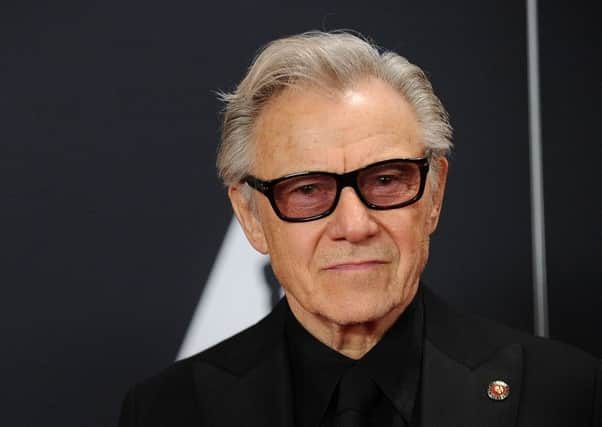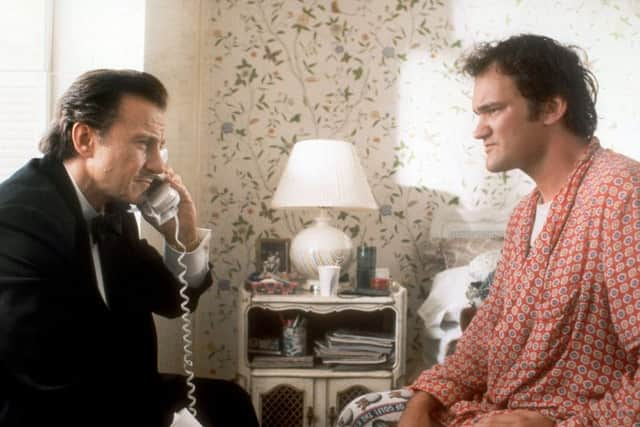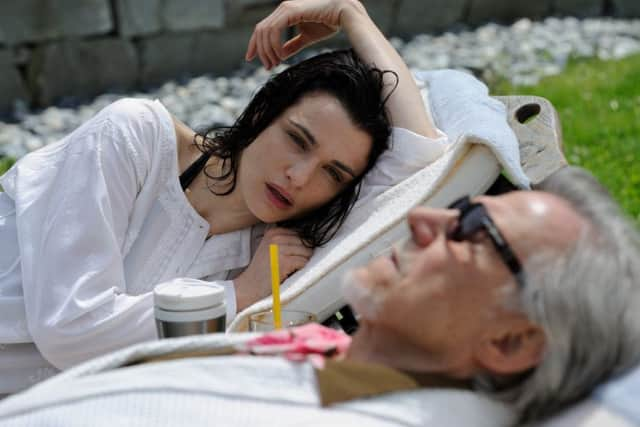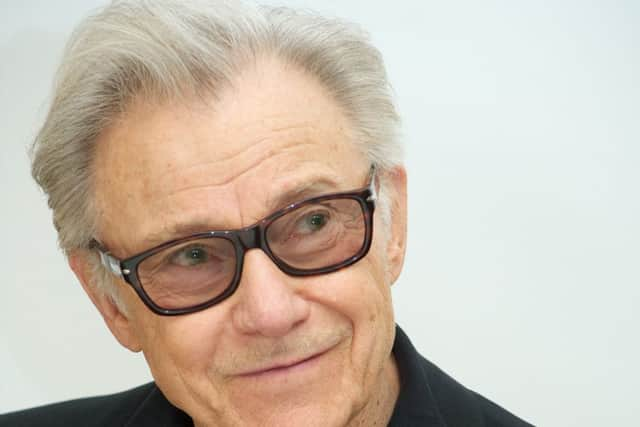Harvey Keitel contemplates the passage of time in Youth


‘Sorry, I’m a little bleary-eyed. Let me think…” Harvey Keitel – dark suit, tinted glasses, neatly clipped grey hair swept back – is sitting in the corner of a vast hotel room in London, looking every inch the powerhouse character actor whose gruff machismo and raw vulnerability have enriched the best work of Martin Scorsese, Quentin Tarantino and Abel Ferrera, among many others. At 76, he’s as vital in person as he is on screen. Somehow, though, I appear to have stumped him with an opening question about his character in Paolo Sorrentino’s new movie, Youth.
“You know, Alistair,” he says, his voice sweeter than you might imagine, “this might detour from the way one is supposed to do an interview. It’s difficult for me to maybe answer a question as readily as someone else might answer a question about the character and such.”
Advertisement
Hide AdNot to worry. My opening gambit was really just a way to delve into a discussion of his extensive career, which seemed appropriate given that Youth follows Sorrentino’s Oscar-winning The Great Beauty by offering up another visually stunning, somewhat whimsical meditation on art and creativity. Set in a luxury Alpine retreat, it revolves around Keitel’s veteran film director and his composer best friend (played by Sir Michael Caine) as they contemplate how to bring their long and storied careers to a close.


“I did the film for the all the values that Paolo Sorrentino had written into the script,” says Keitel after I restate my original question about whether the character’s journey appealed to him at this particular stage in his career. “Paolo’s screenplay offered the opportunity to get up in the morning and be frightened about something other than crossing the street.”
Keitel’s career doesn’t suggest he’s ever been frightened of anything, but he liked how Youth dealt with the passage of time. He also relished the chance to work with Caine, their paths having never crossed before on film. Did they know each other personally?
“No,” says Keitel. “Michael was a very successful actor long before I even had an agent. He’s one of those actors who set a standard for acting. That’s how we crossed paths: me in admiration of him and him not knowing who the hell I was.”
He’s being modest. He and Caine have an easy on-screen rapport and convince as contemporaries and equals. I wonder if that’s in part because they both came from working class backgrounds at a time when being a movie actor wasn’t a viable career option.


“Yeah, we had that in common,” says Keitel, who grew up in the Brighton Beach area of Brooklyn in the 1940s and 1950s, opposite the luncheonette his Jewish immigrant parents ran. “But Michael also served in the British army, and I was in the Marines, and not very many actors these days have served in the military. So we had a language that we both understood from being military men at one time.”
Advertisement
Hide AdKeitel says he joined the Marines when he was a teenager in the hope that it might offer some adventure. Did it?
“It did,” he says without missing a beat. He was deployed to Beirut during the 1958 Lebanon Crisis. “The Marine Corps gave me an identity where I felt heroic. I felt I could sacrifice for another’s benefit. I felt camaraderie. I felt I could endure hardship.”
Advertisement
Hide AdDischarged in 1959, what he subsequently found he had to endure was a life of tedium working a “job-job” as a court stenographer in New York, a government position that made him feel like a Kafka character. When a friend asked him along to an acting class, it’s no surprise he jumped at the opportunity, eventually ending up at The Actors Studio, where he studied under Method pioneers Lee Strasberg and Stella Adler. “My friend left, but I stayed,” he grins.


His first break came in 1965, when he auditioned for a student film being made at New York University. The student’s name was Martin Scorsese. “I met him through an ad he’d placed in a trade paper that actors like me, who didn’t have agents, looked at,” Keitel remembers. They liked each other right away and Scorsese cast him in what would eventually become Who’s That Knocking At My Door, a rough and ready French New Wave-influenced art film about a young, movie-obsessed Italian-American wise guy. He was effectively playing Scorsese’s alter ego and they expanded the character into the role of Charlie for Mean Streets in 1973.
It was this film that really launched his and Scorsese’s careers – as well as that of Robert De Niro, who played Charlie’s live-wire buddy, Johnny Boy. In truth it was De Niro’s career that really went stratospheric, though for a while Keitel remained Scorsese’s actor of choice, appearing in his next film, Alice Doesn’t Live Here Anymore. When Taxi Driver was subsequently offered to Scorsese on the proviso that he cast De Niro in the lead, Keitel didn’t get upset at the snub and even asked the director whether he could play a smaller role in the film than the one his friend had earmarked for him by way of compensation.
“Marty had wanted me to play the campaign worker in the movie, but I said: ‘Let me play the pimp,’ and he said: ‘There are only five lines for the pimp.’ But at the time I was living in Hell’s Kitchen, and on my way home I would see all the pimps and the prostitutes and I had a take on them. So I found a reformed pimp and worked with him.”
His approach was so complete, Scorsese gave him more screen time and together they devised the disturbingly tender scene where his character, Sport, slow-dances with Iris, Jodie Foster’s underage prostitute. It’s one of the most important scenes in the film and wouldn’t have happened without Keitel’s dedication.


Such a positive collaborative experience didn’t occur with Francis Ford Coppola, however, who fired him from the lead in Apocalypse Now the following year after just a few weeks of shooting. Most reports have it that Coppola realised he needed a more passive actor in the role of Willard, and so replaced Keitel with Martin Sheen. Keitel says it more or less boiled down to a business decision.
Advertisement
Hide Ad“At that time Fran-cis and his team were looking to reinstitute the contract player situation of old Hollywood,” he explains, referring to Coppola’s efforts to put all his actors under seven-year-contracts with his production company, Zoetrope. “We agreed to being owned by Francis’s studio at the time because Francis was very good natured about promising freedom. He said he’d let me do whatever movie I wanted to do, which made sense to me because he’d make money from loaning me out.”
The snag came when Brando refused to comply with the agreed shooting schedule. “I had a movie to do in the fall, I think it was James Toback’s Fingers, and Marlon would only shoot in the fall. And so Francis was stuck. He wanted Marlon Brando in the picture – you can understand why – and I said: ‘Francis, you can’t ask me to sign this contract then. As much as you want to give me my freedom, you won’t be able to. This year it’s Marlon, who will it be next year?’ And so he said: ‘Sign the contract or we can’t go forward.’ And so I refused to sign it.”
Advertisement
Hide AdAlthough losing such a high-profile movie was heartbreaking, and may have negatively affected the industry’s perception of him, Keitel actually did some of his most interesting work in that late 1970s period, including coming to Glasgow to shoot Death Watch, a prescient near-future sci-fi drama about a society scarred by its morbid desire to watch reality television. “Oh boy, that’s still one of my favourites,” Keitel beams, proudly enunciating the name of its French director, Bertrand Tavernier, one of the many debut filmmakers he’s worked with who’ve gone on to significant international acclaim.
“He was ahead of his time in terms of the film he was making and I hadn’t been to Europe hardly in those days, so to travel around the lochs and the glens of Scotland was just thrilling to me.”
Other first time film directors with whom he worked during this period were even more impressive, notably Ridley Scott, who cast him as the lead in The Duellists and years later cast him in Thelma & Louise. Like a lot of the “New Hollywood” movie brats who thrived during the 1970s, though, Keitel’s career went through a fallow period in the 1980s. Creatively speaking, things didn’t turn around until Scorsese cast him as Judas Iscariot in his controversial epic The Last Temptation Of Christ, but his real renaissance came in the 1990s, particularly after he took a chance on yet another young first-time filmmaker, Quen-tin Tarantino, whose script for Reservoir Dogs had been passed to him by a colleague at The Actors Studio. “It was all on the page,” says Keitel now of the obviousness of Tarantino’s nascent talent. “He’d never directed a frame of film, but the direction was there on the page.”


It was Keitel who insisted that Tarantino be allowed to direct Reservoir Dogs and he seems to be protective of all his collaborators in this way, treating them as equals regardless of their experience.
“Harvey was just my mate when we were making that film,” Tim Roth remembers. He played Mr Orange to Keitel’s Mr White. “He knew what I was trying to do was difficult and he just had my back. He also just really puts himself out there.”
There’s no denying this last statement. Though the 1990s continued to be a rich decade for Keitel thanks to his continued association with Tarantino on Pulp Fiction and From Dusk Till Dawn, his career was helped by his willingness to push himself to extremes that few other actors of his stature (or age – he was already in his 50s) would even countenance.
Advertisement
Hide AdIn Bad Lieutenant, for instance, he played the crack-addicted cop of the title with eye-watering rawness. It’s perhaps the most fully realised and out-there performance on his CV, even though it was barely a sketch when director Abel Ferrara gave him the script. “It was written in block letters this size because he didn’t have enough pages,” says Keitel, holding his thumb and index finger an inch apart. “I began reading it and about ten pages in I threw it in a garbage can. Literally. But it was also a lead and I was playing a lot of supporting roles at the time. So I went over to the garbage can and took it out.”
He followed it up with another left-field turn in Jane Campion’s New Zealand-set period drama, The Piano, playing the illiterate, Maori-sympathising settler who seduces Holly Hunter’s mute Scottish widow one piano key at a time. The film became one of his biggest hits.
Advertisement
Hide AdHe ascribes a lot of things like this to luck. “I’d say it’s really just been a confluence of luck on my part. And maybe theirs too,” he adds, referring to the many filmmakers who have gone on to become A-listers after working with him. Surely he must acknowledge, then, that he has a good eye for talent. “I guess I’d have to say so,” he laughs. Indeed, even his more recent collaborations with Wes Anderson on Moonrise Kingdom and The Grand Budapest Hotel (he’s also voicing a character in Anderson’s new animated film) came about because he’d wanted to do Anderson’s first movie, Bottle Rocket, back in 1996.
If a budding actor was to draw a lesson from all this it might be that good karma is important, though the advice he gives his own son, Roman, is more practical: “He’s 11, and he wants to be an actor and I say: ‘Okay, be an actor, but learn to write and direct. This way you don’t have to wait around for anybody.”
Given that Youth is the third time he’s played a director in a movie, was he never tempted to have a crack at the profession himself? “I would like to, but I never had the time or the freedom of mind to explore it.”
He can console himself with the fact that, like his character in Youth, his professional life has brought about an enduring life-long friendship in the form of his ongoing bond with Scorsese. They last saw each other a few days earlier at the launch of the current Scorsese retrospective at La Cinémathèque Française in Paris. It seems ridiculous, then, not to ask if they have plans to work together again.
Keitel just smiles. “I can only say – and I can speak for him also I believe – that we have a plan of desire to work together again.”
Twitter: @aliharkness
• Youth is cinemas on Friday